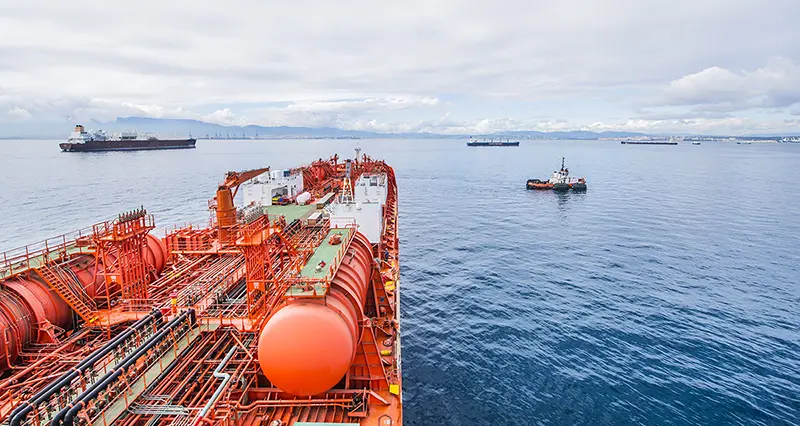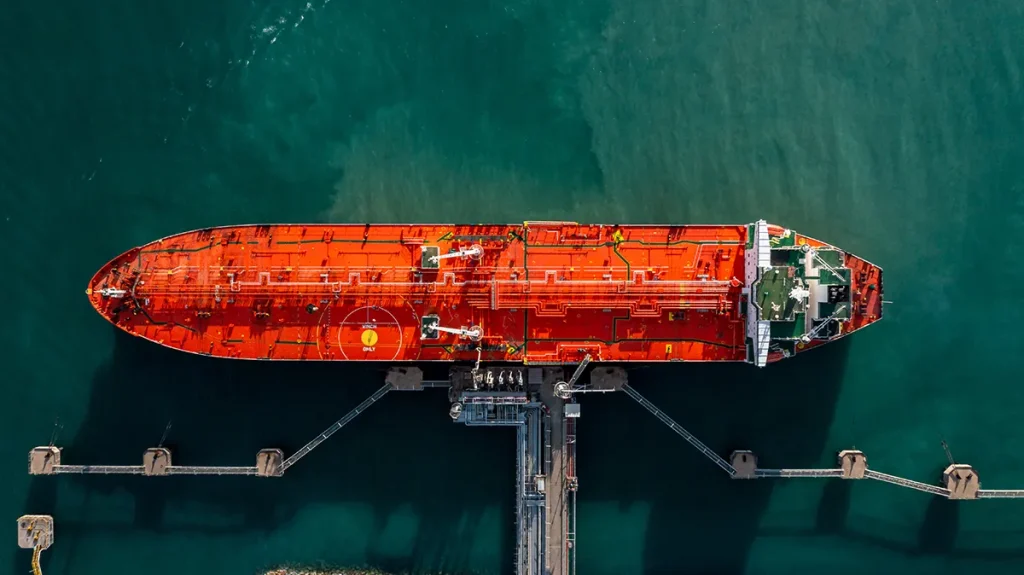For maritime professionals, bunkering operations represent far more than a simple fuel delivery. Although bunkering is a familiar procedure within the shipping industry, achieving efficiency, reliability, and regulatory compliance consistently is a technical challenge that requires careful management and oversight.
In this article, we will explore technical considerations around marine fuel bunkering, highlight operational best practices, and emphasize the critical role of experienced shipping agents in ensuring smooth bunkering processes. We’ll also underline how proactive measures such as bunker surveys can mitigate risks, prevent fraud, and protect the client’s commercial interests.
What does marine fuel bunkering involve?
Marine fuel bunkering is a technically sophisticated operation involving the transfer of specialized fuel oils from land-based facilities, tanker trucks, or bunker vessels directly to a ship. The process includes verifying fuel specifications, carefully monitoring quantities, collecting representative samples, and ensuring compliance with international standards.
Efficient bunkering requires precise coordination between suppliers, receiving vessels, and the port authority. The presence of a knowledgeable and proactive ship agent is indispensable for managing these interactions, identifying potential operational risks, and promptly addressing irregularities or discrepancies during fuel delivery.
Types of bunkering operations and fuel delivery methods
The choice of delivery method significantly influences operational timelines, costs, and safety. An experienced ship agent can provide invaluable advice on selecting the most appropriate bunkering method.
Ship-to-ship (STS) bunkering
STS bunkering, performed at anchorages or open sea, requires precision navigation, careful positioning, and robust safety protocols. Agents facilitate communication and documentation, ensure adherence to established procedures, and help vessels avoid unnecessary delays or potential legal disputes.
Truck-to-ship (TTS) bunkering
TTS bunkering, common in ports with limited infrastructure, demands thorough logistical planning. The agent’s role here involves overseeing scheduling, ensuring the presence of accurate documentation, and coordinating closely between suppliers and port authorities to streamline the process.
Terminal-to-ship (pipe-to-ship, PTS)
PTS bunkering offers efficient high-volume delivery, but the risk of discrepancies in delivered quantities or fuel quality remains significant. Active involvement from ship agents, conducting thorough bunker surveys, helps confirm accurate deliveries and protects clients from potential fraud or operational inconsistencies.
The bunkering process: stages and best practices
Operational excellence in bunkering is rooted in methodical execution and technical vigilance. Ship agents play a vital role throughout every stage.

Pre-bunkering checklist and planning
Effective preparation requires verifying fuel specifications, confirming quantities, reviewing documentation, and ensuring compliance with sampling protocols as per MARPOL and SOLAS. An experienced ship agent proactively coordinates these steps, significantly reducing the likelihood of disputes or delays.
Fuel transfer operations and onboard monitoring
Continuous onboard monitoring and sampling during fuel transfer are vital. Sampling must be representative, uncontaminated, and collected continuously from the receiving vessel’s bunker manifold. An attentive agent ensures rigorous compliance, oversees accurate measurement of fuel quantities, and promptly resolves discrepancies or technical issues that arise during transfer.
Post-delivery checks, sampling, and documentation
Immediately following delivery, agents supervise final quantity measurements, documentation (such as bunker delivery notes), and proper sealing and labeling of retained samples. These samples must be securely stored onboard for at least 12 months. A reputable agent ensures rigorous adherence to these guidelines, safeguarding against fraud or claims related to fuel quality and quantity.
Key risks in bunkering operations
Despite technical advances, risks in bunkering remain, particularly involving safety, environmental incidents, and fraud. Reliable ship agents serve as the first line of defense against these risks.
Safety procedures and spill prevention
Technical measures—such as well-maintained hoses, calibrated measuring devices, leak-proof connections, and spill response plans—are crucial. Agents confirm compliance with these technical safety standards and proactively identify potential hazards, thus significantly reducing spill risks and associated liabilities.
Fraud risks and how agencies ensure transparency
Fraud in bunkering operations, including quantity short-delivery or provision of fuel below specified quality, can severely impact a client’s operational efficiency and profitability. Engaging independent bunker surveyors, coordinated by experienced ship agents, ensures transparency and accountability. Bunker surveys verify fuel quantities and specifications accurately, preventing fraudulent practices and safeguarding the financial interests of shipowners and operators.
Regulations and compliance in bunkering
Compliance with regional maritime regulations is mandatory. Ship agents play an essential role in ensuring regulatory adherence, reducing the risk of fines, detentions, or reputational damage.
MARPOL, SOLAS, and environmental responsibilities
Agents facilitate compliance by overseeing sampling procedures mandated by MARPOL guidelines, ensuring proper documentation, and confirming that fuels meet required environmental standards. This vigilance protects vessel operators from regulatory scrutiny and associated operational disruptions.

Bunker surveys, sampling, and regulatory documentation
Accurate and transparent bunker surveys are fundamental to compliance and fraud prevention. Independent surveyors, under the guidance of shipping agents, collect and secure representative samples, document delivery accurately, and confirm fuel quality standards, all in strict adherence to MSC-MEPC sampling guidelines.
Industry terms: synonyms and related concepts
Technical clarity in bunkering discussions benefits professionals across the industry:
- Bunker fuel oil: Fuel used specifically for maritime vessels, subject to strict quality controls.
- Bunker Delivery Note (BDN): Official document specifying fuel details, confirming compliance.
- Retained sample: Securely stored representative sample for verifying compliance and resolving disputes.
- Bunker survey: Independent verification of delivered fuel quantity and quality, critical for fraud prevention.
Why reliable bunkering agencies matter
In a technically demanding and highly regulated industry, the value of an experienced ship agent in bunkering cannot be overstated. Efficient bunkering involves proactive risk mitigation, rigorous compliance management, and vigilant fraud prevention.
At Ibérica Marítima, we leverage decades of specialized expertise to deliver exceptional bunkering coordination. Our agents closely manage each phase of the process. Through diligent monitoring, rapid troubleshooting of discrepancies, and strict regulatory compliance, we consistently safeguard your operational and financial interests.
Choosing a maritime agency should never be a compromise. Trust us for technical excellence, transparency, and the personalized commitment your operations demand.


